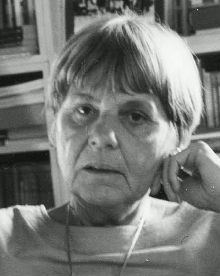Related Research Articles

Rita Süssmuth is a German politician of the Christian Democratic Union (CDU). She served as the tenth president of the Bundestag.

The University of Duisburg-Essen is a public research university in North Rhine-Westphalia, Germany. In the 2019 Times Higher Education World University Rankings, the university was awarded 194th place in the world. It was originally founded in 1654 and re-established on 1 January 2003, as a merger of the Gerhard Mercator University of Duisburg and the university of Essen. It is based in both the cities of Duisburg and Essen, and a part of University Alliance Metropolis Ruhr.

Otfried Höffe is a German philosopher and professor.

Regina Becker-Schmidt was a German psychologist and sociologist who was professor at the Institute of Sociology and Social Psychology at the Leibniz University Hannover. Her research focuses on corporate and subject theory, critical theory, psychoanalytically oriented social psychology and gender studies. She is considered a seminal figure in feminist critical theory.
Feministische Organisation von Planerinnen und Architektinnen is an organisation working to address gender issues in the built environment generally and among professionals active in this field.
Karin Flaake is a German sociologist and professor (retired) at the Carl von Ossietzky University Oldenburg. Her publications on the adolescence of young women and men are part of the literature of socio-psychologically oriented gender research. Another focus of her work is on the chances of changing gender relations in families.
Margrit Brückner is a feminist German sociologist and a retired professor of the Frankfurt University of Applied Sciences. Her publications on girls and women at work, and, especially, her work on violence against women, have become core academic texts. Another of her more notable specialities involves her contributions to the international debate on (social) care.
The NRW School of Governance is a central institution within the Institute for Political science at the University Duisburg-Essen and was founded in 2006 under the direction of Karl-Rudolf Korte.

Karl-Rudolf Korte is a German political scientist and since 2002 professor at the University of Duisburg-Essen on Campus Duisburg. He appears regularly in national media as a guest for election analyses.
Heike Fleßner was a German educationalist and professor, whose work focused on social education and social work. She was a Professor of Social Pedagogy at the Carl von Ossietzky University of Oldenburg from 1996 until her retirement in 2009. Her scientific work focuses on analytics and conceptual developments in the field of gender- and diversity-conscious social education. For many years, Fleßner was involved in social policy and the institutional anchoring of public toddler care and early childhood education.
Viktoria Schmidt-Linsenhoff was a German art historian and professor with particular research interest in the fields of gender studies and postcolonial studies.

Lann Hornscheidt is a German academic active in the fields of gender studies and linguistics. Hornscheidt is non-binary.
The Stahlstraße is a street in the western district of Essen Germany. It is the city's red-light district. Stahlstraße is a dead end has a privacy screen across its entrance. It is located northwest of the city centre, about 200 metres southwest of the University of Duisburg-Essen and 300 metres northwest of the Limbecker Platz shopping centre.
Utta Isop is an Austrian philosopher and gender researcher, author and editor. Her main focuses are gender democracy, unconditional basic income, solidarity economy, and social movements.
Kathrin Hoffmann-Curtius was a German, independent art historian, who taught for a time at the universities of Tübingen, Hamburg, Trier and Vienna.
Irene Stoehr was a German feminist historical social scientist and journalist. Her main research interests were the feminist movement and gender history in the 20th century.
Eva Cyba is an Austrian sociologist. Her research, teaching and publications focus on sociological theories of social inequality, feminist theories and women's studies, in particular women in the world of work. She is the winner of the Käthe-Leichter-Staatspreis. Her book Gender and Social Inequality is considered a fundamental work of sociological gender research.

Gabriele Dietze is a German culturologist, university teacher, gender-theorist, essayist and author.
Judith Goetz is an Austrian literature and political science scholar, gender researcher, political illustrator and right-wing extremism expert.
Christina Klausmann was a German historian, publicist and curator specializing in gender relations and women's movement culture in Germany.
References
- 1 2 "Dr. Heike Mauer". University of Duisburg-Essen. Retrieved 15 April 2023.
- ↑ Temel, Brigitte (2018). "Rezension - Heike Mauer: Intersektionalität und Gouvernementalität - die Regierung von Prostitution in Luxemburg". Femina Politica - Zeitschrift für feministische Politikwissenschaft (in German). 27 (2): 200–202. doi:10.3224/feminapolitica.v27i2.23. ISSN 1433-6359. S2CID 189673676.
- ↑ Fey, Mira (2019). "Rezension - Heike Mauer, 2018: Intersektionalität und Gouvernementalität: Die Regierung von Prostitution in Luxemburg". GENDER - Zeitschrift für Geschlecht, Kultur und Gesellschaft (in German). 11 (3): 156–158. doi: 10.3224/gender.v11i3.12 . ISSN 2196-4467.
- ↑ Ludwig, Anne (6 April 2018). "Der Kampf gegen das "Kellnerinnen-Unwesen"". Tageblatt (in German). Retrieved 15 April 2023.
- ↑ Kerner, Ina (March 2022). "Mauer, Heike, und Johanna Leinius (Hrsg.) (2021): Intersektionalität und Postkolonialität. Kritische feministische Perspektiven auf Politik und Macht". Politische Vierteljahresschrift. 63 (1): 129–132. doi: 10.1007/s11615-021-00371-6 .